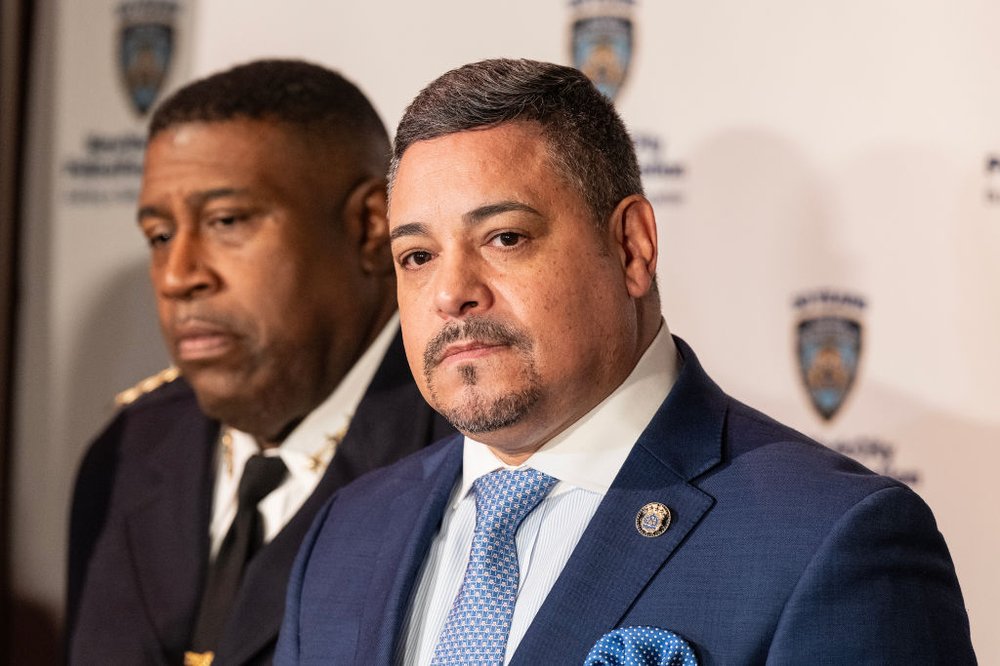NYPD leaders spar with NYC councilmembers over subway crime, National Guard presence
March 20, 2024, 6:21 p.m.
Police brass and lawmakers faced off on public safety issues after a spate of high-profile incidents.

Top NYPD officials told local lawmakers on Wednesday that New York City’s subway system remains generally safe despite a string of recent high-profile crimes that have raised concerns about public safety on trains and platforms.
But several members of the City Council pushed back on police officials’ accounts, questioning whether stepped-up policing and the presence of National Guard soldiers in the subway are having their intended effect of deterring violent crime and making riders feel safer.
The at-times tense back-and-forth came during a Council hearing on Mayor Eric Adams’ preliminary budget proposal for the NYPD for next fiscal year. Lawmakers are reviewing Adams’ latest spending plan for the city, totaling roughly $109 billion, including about $6 billion for the NYPD. The administration and Council must reach a deal on the city’s budget before July, when the next fiscal year starts.
The hearing also came less than a week after an altercation between riders on an A train in Downtown Brooklyn escalated into a shooting and underground chaos that made national headlines — the fourth shooting in the city’s transit system this year.
“Black and brown men get swept up in our criminal justice system,” said Councilmember Lincoln Restler, who represents parts of northern Brooklyn. “It is devastating our communities. We have returned fully to the era of broken windows policing.”
Police Commissioner Edward Caban testified that overall crime in the transit system declined by 3% in 2023, including an 8% drop in December. He acknowledged an uptick in subway crime in January, but said the total number of serious transit crimes that occurred that month represented less than 2% of crimes citywide.
Caban also attributed increased perceptions of subway crime to alleged “career criminals” who repeatedly commit violence, such as three people he said were arrested more than 100 times each for various crimes, including assaulting MTA employees.
But his testimony ran counter to other police data, with overall transit crime having jumped almost 7% so far this year compared to the same period in 2023, according to the NYPD’s CompStat database. There were 467 transit crimes through March 17, versus 437 last year.
“No matter how traumatizing even a single act of violence can be, our transit system is not actually being overrun by crime,” Caban told councilmembers. “Rather, some very real acts of violence are driving a legitimate perception of danger.”
The deployment of National Guard members and more police officers in the subway, he added, “will go a long way as both a deterrent to those willing to commit a crime and a measure of comfort to innocent law-abiding straphangers.”
New York Gov. Kathy Hochul earlier this month ordered the National Guard and state police to help the NYPD perform random bag checks at some of the city’s busiest transit hubs. Just weeks before, the mayor — who is a former NYPD officer — had sent in an additional 1,000 police officers to patrol the subway. Civil rights advocates and progressives have criticized the moves, arguing the amplified presence of law enforcement would lead to inequitable policing based on race.
During Wednesday’s Council hearing, protesters interrupted Caban’s testimony, prompting lawmakers to call for order in the chambers. But some elected officials appeared to sympathize with the protesters, expressing disappointment over the NYPD’s handling of public safety issues.
“Police alone can’t solve this,” Public Advocate Jumaane Williams said of such issues, adding that “other people here” in the room agreed with him.
As the commissioner testified, Councilmember Tiffany Cabán, a democratic socialist who represents neighborhoods in northwest Queens, said on the social media platform X that his remarks underscored how “the billions [of dollars] we throw into policing provide a poor return on investment.”
“Pumping those dollars into housing, our schools and healthcare system would get far better results,” she said.
Some lawmakers highlighted the fact that the NYPD’s spending on officer overtime has risen markedly in recent years. That’s also been the case for officers assigned to the subways: Last year, overtime pay for such officers skyrocketed to $155 million, up from $4 million in 2022, Gothamist previously reported.
“The continued spending and excess of the budget on overtime only intensifies concerns about the department’s management of its budget and workforce,” Council Speaker Adrienne Adams said.
Fleeing riders forced to exit single file at nearby Brooklyn station after subway shooting, riders say Brooklyn DA says 'evidence of self-defense' means no charges for alleged A train shooter, for now A timeline of New York City subway shootings in 2024 In Brooklyn subway shooting, who should be charged with a crime?